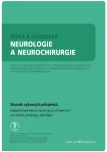Monitoring the prevalence of pressure ulcers – a comparison of national data with data of a specific health care provider – University Hospital Ostrava
Authors:
L. Krupová 1; M. Krupa 2; K. Benešová 3; J. Mužík 3,4; Jiří Jarkovský 3,4
; P. Búřilová 4; D. Dolanová 4; S. Saibertová 4; M. Klugar- 4 6; A. Pokorná 4,6
Authors‘ workplace:
Kožní oddělení, FN Ostrava
1; Fakulta podnikohospodářská, VŠE v Praze
2; Institut biostatistiky a analýz, LF MU, Brno
3; Ústav zdravotnických věd, LF MU, Brno
4; Ústav veřejného zdraví, LF MU
5; Brno CEBHC-KT, LF MU, Brno
6
Published in:
Cesk Slov Neurol N 2022; 85(Supplementum 1): 21-27
doi:
https://doi.org/10.48095/cccsnn2022S21
Overview
Aim: The study aims to compare the available data on the prevalence of pressure ulcers from national databases with the data of a specific provider of health services – University Hospital Ostrava, analysis of the differences found and identification of their causes. Materials and methods: Retrospective observational study. The file included data on hospitalisations of patients with pressure ulcers from the National Register of Reimbursed Health Services (NRRHS) and the Hospital Information System of the University Hospital Ostrava (HIS UHO) from 2018 to 2020. Results: Between 2018 and 2020, a total of 294 hospitalisations of patients with pressure ulcers were reported to the NRRHS, while 2,231 were registered in the HIS UHO. The number of hospitalisations with pressure ulcers was up to eight times higher in the analysed period in the HIS UHO than can be detected from the diagnosis with the code L89 according to ICD-10 for health insurance companies. There is an average of 1.6 pressure ulcers per hospitalisation. The structural differences in the prevalence of pressure ulcers between HIS UHO and NRRHS (higher proportion of lower pressure ulcer categories, lower average age of patients with pressure ulcers and higher mortality of patients with pressure ulcers) are probably because a patient appears once in NRRHS regardless of the number of pressure ulcers and because lower pressure ulcer categories are not reported because they usually do not require an identifiable procedure from the list of medical procedures. Conclusion: The study showed that the actual prevalence of pressure ulcers could be significantly higher than the available national NRRHS statistics. The study results also support the importance and necessity of research on the cost-effectiveness of the prevention and treatment of pressure ulcers.
Keywords:
Epidemiology – pressure ulcers – prevalence – retrospective study
Sources
1. Pokorná A, Mužík J, Búřilová P et al. Pressure lesion monitoring – data set validation after second pilot data collection. Cesk Slov Neurol N 2018; 81/114 (Suppl 1): S6–S12. doi: 10.14735/amcsnn2018S6.
2. Pokorná A, Jarkovský J, Mužík J et al. A new online software tool for pressure ulcer monitoring as an educational instrument for unifi. Mefanet J 2016; 4 (1): 26–32.
3. Pokorná A, Benešová K, Mužík J et al. The pressure ulcers monitoring in patiens with neurological diseases – analyse of the national register of hospitalized patients. Cesk Slov Neurol N 2016; 79/112 (Suppl 1): S8–S14. doi: 10.14735/amcsnn2016S8.
4. Kambová V, Pokorná A, Saibertová S. The knowledge and practises of nurses in the prevention of medical devices related injuries in intensive care – questionnaire survey. Cesk Slov Neurol N 2019; 82/115 (Suppl 1): S19–S22. doi: 10.14735/amcsnn2019S19.
5. Pokorná A, Štrombachová V, Búřilová P et al. Centrální systém hlášení nežádoucích událostí – Metodika Nežádoucí událost DEKUBITUS. [online]. Dostupné z URL: https: //shnu.uzis.cz/res/file/metodicke_dokumenty/Dekubitus_plna_verze_metodiky.pdf.
6. Kottner J, Cuddigan J, Carville K et al. Pressure ulcer/injury classification today: an international perspective. J Tissue Viability 2020; 29 (3): 197–203. doi: 10.1016/j.jtv.2020.04.003.
7. Shiferaw WS, Aynalem YA, Akalu TY. Prevalence of pressure ulcers among hospitalized adult patients in Ethiopia: a systematic review and meta-analysis. BMC Dermatol 2020; 20 (1): 15. doi: 10.1186/s12895-020-00 112-z.
8. Lenche N, Damevska K, Nikolchev A et al. The influence of comorbidity on the prevalence of pressure ulcers in geriatric patients. Glob Dermatol 2016; 3 (3): 319–322. doi: 10.15761/GOD.1000183.
9. Børsting TE, Tvedt CR, Skogestad IJ et al. Prevalence of pressure ulcer and associated risk factors in middle - and older-aged medical inpatients in Norway. J Clin Nurs 2018; 27 (3–4): e535–e543. doi: 10.1111/jocn.14088.
Labels
Paediatric neurology Neurosurgery NeurologyArticle was published in
Czech and Slovak Neurology and Neurosurgery

Most read in this issue
- Nurses‘ knowledge in the field of specific prevention and treatment of heels pressure injuries
- Monitoring the prevalence of pressure ulcers – a comparison of national data with data of a specific health care provider – University Hospital Ostrava
- Standardization of wound care for patients in Austria, Germany and Slovakia
- Advanced practice nursing in the field of wound management
